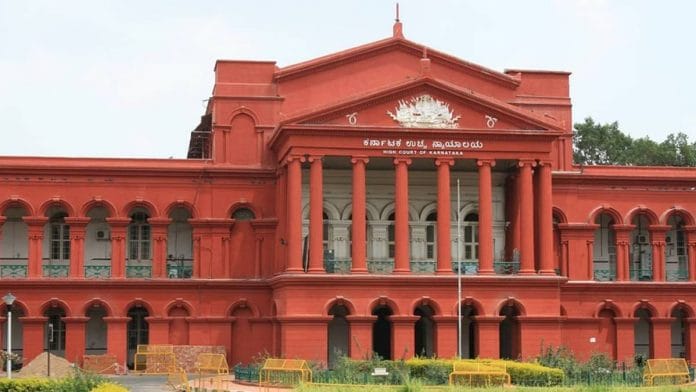New Delhi: In a judgment that was made available in the public domain Monday, the Karnataka High Court has held that protesting against the 2019 Supreme Court ruling in the Ram Janmbhoomi-Babri Masjid case amounts to promoting enmity between two groups on the ground of religion.
The high court was hearing a petition, filed by a man identified in the judgment as Safwan, seeking to quash criminal proceedings against him, following suo moto proceedings initiated against him and five others for protesting and sloganeering against the SC judgment.
“[It] is nothing but promoting enmity between two groups on the ground of religion, which act is prejudicial to maintenance of harmony in Mangaluru area,” the high court said in its judgment dated 14 October.
However, the court quashed criminal proceedings against him for want of a sanction from the state government for taking cognisance of the offence as required under law.
The petitioner, according to the judgment, was accused of being a member of the Campus Front of India (CFI), the student wing of Popular Front of India (PFI), which was banned along with its affiliates including the CFI in September this year under the Unlawful Activities (Prevention) Act.
The Supreme Court in 2019 had awarded the entire 2.77 acres of the disputed site where the Babri Masjid once stood to the Hindu community, which holds that the site is the birthplace of Ram Lalla, granting the Muslim community five acres of land to build a mosque elsewhere in Ayodhya.
Also read: ‘Land mafia’, mystery of missing idol — ‘Yogi temple’ in Ayodhya courts string of controversies
‘Cannot be taken lightly’
According to the Karnataka HC judgment, in November 2019, Mangaluru’s Konaje Police Station booked the six men (Athaulla, Panjalakatte, Imran R.J., Mohd. Asif, Mohd. Riyaz, and Safwan — the petitioner) under sections 153 (A) and 149 of the Indian Penal Code (IPC) and section 3 of the Karnataka Open Place Disfigurement Act 1951 and 1981.
While section 153 (A) relates to promoting enmity between different groups on grounds of religion and doing acts prejudicial to maintenance of harmony, Section 149 lays down provisions for every member of unlawful assembly guilty of offence committed in prosecution of common object. Section 3 of the Karnataka Open Place Disfigurement Act, 1981, meanwhile, includes provisions for penalty for unauthorised disfigurement by advertisement.
According to the judgment, while on patrolling duty, police constable Ashok Kumar had received “credible information” about “some people belonging to PFI” sloganeering against the SC verdict in front of the house of a person identified as Abbas, near the Badriya Jumma Masjid in Mangaluru.
The group of people, allegedly belonging to CFI and PFI, were also accused of going inside the Mangaluru University campus and sloganeering against the SC judgment, with the intention to outrage religious feelings by putting up posters and indulging in a “dispute” in the public place, the high court judgment added.
Following this, the police registered the case under the relevant sections and filed a chargesheet against the petitioner and others.
‘Nothing but promoting enmity by Campus Front of India member’
While pleading for quashing the proceedings against him, the petitioner’s advocate Haleema Ameen argued that there was no direct evidence against the petitioner and he is not a member of any of these organisations.
The petitioner cited judgments of the coordinate bench of the HC in the Atul Kumar Sabarwal @ Madhugiri Modi Vs. State and Karnataka and others case this year and Mohammed Ataulla. A and others Vs. State of Karnataka case of 2020 to argue this stand.
In these two cases, it was held that in order to bring an action under Section 153 (A) of IPC, the acts alleged against the accused must be intended to promote feelings of enmity, hatred or ill will between two different religions or religious groups or caste or communities.
The prosecution lawyer, B.J. Rohith contended, however, that the petitioner was a member of the CFI and had participated in the protest against the SC in November 2019 inside the Mangaluru University campus. The judgment mentioned him as adding that the petitioner also resided near the university campus.
The court held, “There are witnesses who have stated the presence of the petitioner among the group who agitated against the judgment… which is nothing but the offences against the State, punishable under Section 153-A of IPC.”
The court further said: “[The petitioner along with other accused put up] posters in public places near the Badria Jumma Masjid with a caption ‘all should awake against refusal and for justice and to raise slogan’ and also in the university campus at Mangaluru calling the public, especially, the Muslim community to raise slogans against the violation of justice in respect of the judgment delivered in Ayodhya-Babri Masjid case by the Supreme Court (sic).”
Observing that the present case “stands on a different footing” than the ones referred to by the defense, the single judge bench of Justice K. Natarajan said it “cannot be taken in a lighter way” (sic).
“The case in hand stands on different footing, where the accused persons being the part of the CFI organizations and the petitioner being the local person residing near the university campus of Mangaluru, went along with the others with the banner of CFI and protested against the judgment of the Hon’ble Supreme Court delivered in Ayodhya-Babri Masjid case..(sic)”, the order said.
(Edited by Poulomi Banerjee)
Also read: Gyanvapi case reopens the politics of religion that Supreme Court had sealed shut in Ayodhya






